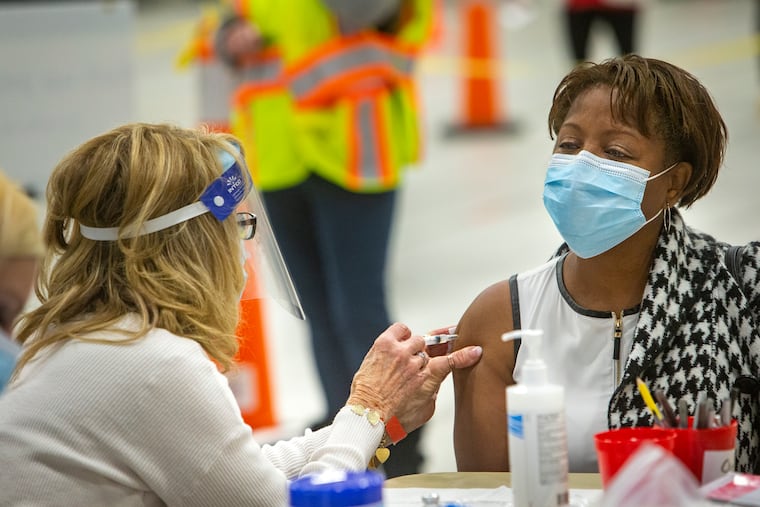Thousands of Pa. and N.J. nursing home residents and staff still haven’t had COVID-19 shots
More than 179,000 doses have been given in the two states, which are home to nearly 378,000 long-term care residents and staff. The vaccines require two doses to be effective.

As healthy 65-year-olds scramble to find scarce COVID-19 vaccines in Pennsylvania and New Jersey, thousands of vulnerable people in those states’ highest priority group — people who live in nursing homes and assisted living facilities — are still waiting for shots.
They are part of a federal program that gave pharmacy giants CVS and Walgreens the responsibility of going from facility to facility to give shots. So far, that program, which began vaccinating nursing home residents and staff on Dec. 28, has used only about 16% of allocated doses in Philadelphia and 14.5% in New Jersey, according to health department data. The situation is less clear in Pennsylvania, which did not divulge how many shots it has allotted for the program.
More than 179,000 doses have been given in the two states, which are home to nearly 378,000 long-term care residents and staff. The vaccines require two doses to be effective.
In New Jersey, Gov. Phil Murphy said last week that the program’s pace is “not acceptable.” About 90% of long-term care providers have vaccine appointments, he said, but “that’s not fast enough.” He wants the chains to assign more people to the effort.
In Pennsylvania, Adam Marles, president and CEO of LeadingAge PA, which represents nonprofit senior housing providers, said the program has been “extraordinarily frustrating.” He said many nursing homes have had their first vaccination clinics, but one last week had to seek help from its state senator to secure a first appointment on Feb. 7.
Pennsylvania initially prioritized only nursing homes because they have been hotbeds of infection and death. Because of that, the pharmacy partners began scheduling visits only to personal care and assisted living facilities last week, Marles said. Less than a third even know when their first vaccination clinic will be, he said.
He said there has been a lot of “finger pointing” between state and federal program officials. “It’s unclear where the fault lies,” he said.
» READ MORE: No phone hotlines, multiple websites, long lines: Getting a COVID-19 vaccine is confusing in Pa. and N.J.
He thinks facilities should be given more flexibility to hire other pharmacies to give the shots. He also thinks that retirement communities that house people who live independently as well as those who need personal care and nursing home level care should be able to vaccinate everyone in one visit.
Frail elders who live in congregate settings were supposed to be the top priority for vaccines, along with health care workers. Now, many states have expanded vaccine eligibility to people 65 and up who live at home, as well as younger people with chronic health conditions that magnify risk. Philadelphia, which has its own vaccination program, has made people 75 and up eligible.
“As it turns out, lots of people are getting vaccines before people in nursing homes,” Marles said.
A CVS spokesperson said that it has an “army” of professionals giving vaccines and that it is not a good idea to compare doses allocated with doses given because the allocations were based on the number of beds in a facility. However, occupancy is lower than bed count and many staff members are declining to be vaccinated.
Marles said that he has heard that 50% to 70% of staff are choosing to be vaccinated while well over 90% of residents are.
» READ MORE: The wait for a vaccine is frustrating teachers and adding uncertainty to school reopening plans
Walgreens said it has given more than one million COVID-19 vaccinations at long-term care facilities and other vulnerable populations and expects to finish giving first doses in nursing homes by Jan. 25. CVS, which has also given more than one million doses as part of the long-term care program, said it is “on track to complete the program consistent with timelines originally shared with states and provided by the Centers for Disease Control and Prevention.
The federal government last reported 4.7 million doses allocated to the long-term care program on Jan. 14 and no longer plans updates. At that point, about a quarter of those doses had been given to residents and staff. The CDC now says that 2,089,181 doses have been given.
Philadelphia estimates that it has almost 14,000 residents of long-term care and close to 15,000 staff members. If they all got two doses of vaccine, the city would need roughly 58,000 doses.
The city so far has allocated 42,900 doses to the long-term care program. Of that, 6,814 had been administered this week.
New Jersey has 90,000 nursing home and personal care employees and 55,000 residents. If they all got shots, they would need 290,000 doses.
» READ MORE: An illustrated guide to how the COVID-19 vaccines work
The state has allocated 452,000 doses for the federal program, which, in New Jersey, also includes state centers and group homes for the intellectually disabled, and HUD senior housing. So far, 65,583 doses have been administered, the state health department said. (The CDC says 71,577 doses have been given.) The reason for the discrepancy is unclear.
Pennsylvania estimates that it has 88,000 residents of long-term care facilities and 116,000 staff. They would need 408,000 doses if they were all vaccinated.
The state health department said it allocated 45,825 doses of the Pfizer vaccine to the long-term care program this week. That’s 32% of the total doses the state received this week. Since vaccination began, it has received 1.2 million doses. According to the CDC, 107,034 doses have been given to residents and staff of long-term care facilities in Pennsylvania.